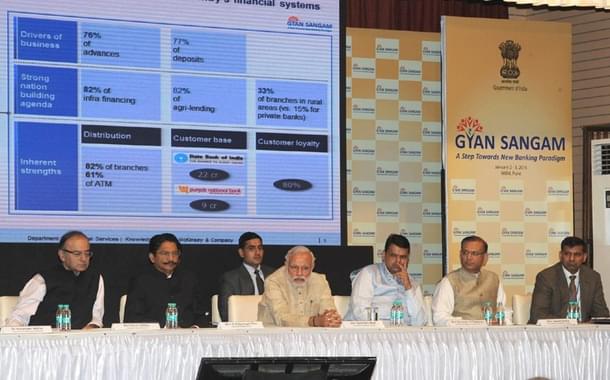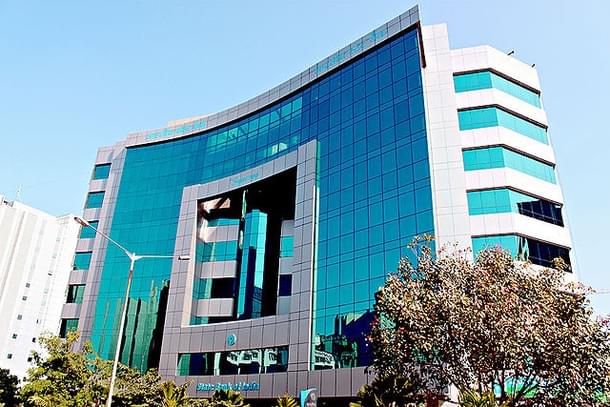Economy
5 Steps to Let Our Public Sector Banks Flourish
Vivek Kulkarni
Jan 12, 2015, 07:22 PM | Updated Feb 18, 2016, 12:09 PM IST
Save & read from anywhere!
Bookmark stories for easy access on any device or the Swarajya app.


Just let our public sector banks be and allow them to take decisions on their own.
The Modi government has to be congratulated for holding Gyan Sangam, that deliberated on commercial bank reforms. Hasmukh Adhia, the Banking Secretary quoted the Prime Minister as saying, “The PM assured all the bankers that there will be no interference from the government in the functioning of the banks…Not even from the Prime Minister’s office”

The PM’s statement is subtle. One can believe that Prime Minister Modi, with no visible family or personal business linkages, would not personally interfere in the internal working of banks. Yet the government’s interference with banks is at various levels. While the PMO may not intervene, other ministers or MPs from all political parties usually find it difficult to resist the temptation to interfere. For them, it could be a ‘constituency call’. How the Modi government puts an end to this practice will be interesting to watch. Here are a few ways by which the government can reduce interference and empower the banks.
1. Ministry not to focus on bank operations
The Ministry of Finance should refrain from issuing operational instructions. In the past, the Ministry came up with a process on how banks should be promoting their officers. The instruction stipulated that the officer must have enough rural experience before he is promoted. This has already been done in most PSU banks and every bank has many officers well trained in rural area.
The trouble is to find the right resources, who can do risk management, liquidity gap planning, capital allocation or treasury and investment functions. Many banks have solved this problem with lateral recruitment of MBAs, CAs and other qualified finance professionals. Indian banks are large and sophisticated and can do the job themselves. The ministry is better off focussing on strategic issues and leaving the operational issues to the bank’s CEO.
2. Prefer large bank officers in promotions
The government should stop appointing bankers from small banks to senior positions in the five large, systemically important banks—State Bank of India, Punjab National Bank, Bank of Baroda, Bank of India and Canara Bank.
Quite often, executives of smaller banks are promoted faster as General Managers and thus have a chance to become Executive Directors (ED) of very large banks at a relatively young age. A GM of large bank deals with much larger portfolios, diversities and complications, and hence, equating GMs of large and small banks may not be correct. The GM of large bank could work as ED of small banks and not vice versa. The small banks have a disproportionate number of EDs in our banking system, which is not equitable.
3. Level playing field with private banks
These large PSU banks should be offered a level playing field with private banks and made truly autonomous. Most savvy bankers would agree that State Bank of India is India’s premier bank and has some of the best professionals. Even the now thriving Axis Bank has been built by the hard work of several former SBI officers.
How did SBI become more prestigious than other PSU banks?
SBI was owned earlier by RBI and thus escaped political intervention for decades. No outside bankers were appointed to occupy senior positions in SBI, except in one or two rare cases. Only internal officers were promoted. Thus the senior officers have a thorough knowledge and familiarity with the processes of bank, are loyal to their home bank and do well.

In other PSU banks, the EDs and the CMD are appointed from different banks. These officers may have no loyalty towards their new bank, and take a long time to understand the processes, and often may not fit into the bank’s culture. In addition, they are appointed for a short tenure which makes their tasks even more difficult.
We have seen cases where both the CMDs and EDs are new, and take time to come to terms with the new institutions where they are posted. If one talks to the GMs of such banks, one gets to hear horror stories of how CMD/ED, who came from other banks have governed with the least respect for the local banks’ culture. Hence, it is not a bad idea if the GMs of these large PSBs promoted as EDs, continue in their own banks, in the interests of continuity.
While the reforms in autonomy should be immediate for the top five banks, eventually all PSU banks should get more autonomy. The Ministry should build them as independent autonomous national banks. The majority of positions on the banks’ boards must be given to insiders with the exception of nominees of the Union Government and the RBI. The bank board may opt for reputed economists, industry experts, and risk management professionals as required. The Government need not nominate them.
4. Avoid repressive funding
Government financing has been repressive for its citizens. It borrows far too much. If you earn Rs 8 Lakh a year, would you keep 50% of your salary for paying just interest on loans? Another Rs 2 lakh for paying the principal? This is what the Government of India has been doing for a number of years. To make sure that they get their money at reasonable interest rates, the Government has prescribed the Statutory Liquidity Ratio and has forced banks to invest in government securities, to fund its own fiscal deficit.
All Indians save about Rs 6.5 lakh crore a year and put them in savings deposits with banks. The Central Government borrows Rs 5.2 lakh crore out of this, leaving just Rs 1.3 lakh crore for all private firms. This crowding out is repressive for all and makes it hard for companies to get adequate funds from banks. Only large firms can muscle in and get funds. MSMEs often find it hard to get money from the formal banking system and depend on informal finance. The Union Government has to do away with SLR gradually and give the choice to bankers determine their investment portfolio.
5. Reform vigilance
The most crucial reform that will make the bankers bold and start lending lies in changing the vigilance system. At present, any loan that goes bad attracts a vigilance scrutiny. The external vigilance officers are not bankers and are highly risk-averse. Banking is a business that deals with credit, interest rate, liquidity, foreign exchange risks in a routine manner. While taking decisions in such an uncertain environment, about 2% loans might become NPA.
If every loan that goes bad is investigated and a banker is punished, it is simply not fair. Of course, if the banker is found to have taken the decision in a mala fide manner, has done it for extraneous considerations, or accumulated disproportionate assets, he should certainly be prosecuted. In most vigilance cases the amount is small and the long-drawn cases due to our slow and erratic investigation and justice system punish the banker who stands exhausted with a devastated career, when exonerated at the end. Private banks also investigate mala fide actions, and punish erring executives, but this happens swiftly and without the tortuous criminal investigation process.
I have seen a few corrupt senior bankers who have managed good tenures, built huge houses and escaped any vigilance scrutiny. Our vigilance system specialises in catching small guys who have made small loans. The big guys who have made suspect loans in thousands of crores often escape.
Each bank can set up its own vigilance system. A committee with bankers and independent directors can decide if the employee has to be prosecuted. All other cases may be dealt at departmental enquiry level and appropriate punishments instituted in the bank.
More Gyan Sangams
I have interacted with a many senior PSU bankers. I have found many of them highly professional, intelligent and full of industry knowledge. The Ministry of Banking has done well to organise internal brainstorming. The subtle message of non-interference in internal working of banks is a good beginning. Let us hope more Gyan Sangams are organised and the Modi government avoids repressive financing, provides a level playing field for PSU banks and takes Indian banks forward.
Views expressed are personal.
Vivek Kulkarni is former IT Secretary, Government of Karnataka, and founder of Brickwork Group.





